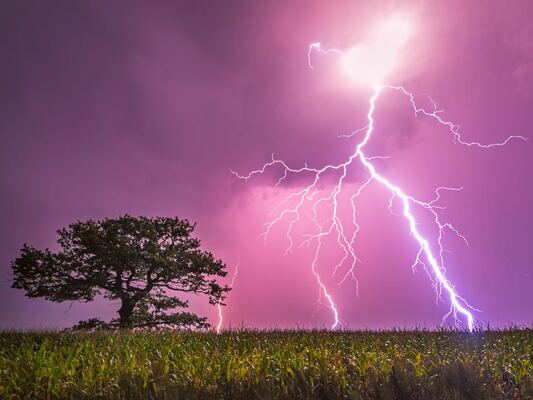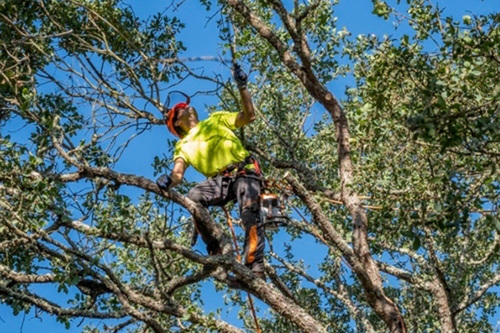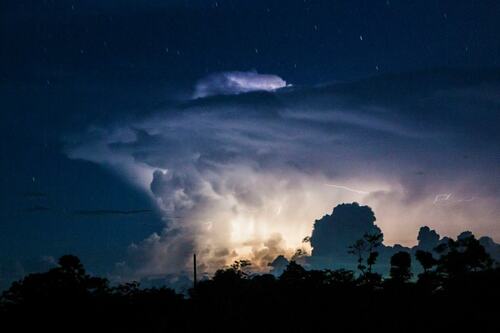5 Expert Tips to Protect Your Trees from Severe Summer Storms

Introduction
Though a severe summer storm cannot be stopped, you can take preventive steps to protect your trees from extensive damage during another storm.
Typical summertime images: Backyard barbecues, baseball games, weekends at the beach or pool. Typical summertime sounds: Fireworks, lawn mowers, children’s laughter after sundown. Alas, there is another warm weather event—the very real and dramatic summer storm. We are awed by the images and startled by the sounds; then we survey any damage to the landscape from its fury. Many of us probably remember particularly strong summer storms from the past. Your neighborhood was without power, roof shingles were scattered over lawns like fall foliage, and towering trees were torn down.
Here are five tips to protect your trees from summer storms.
Thinning the Canopy

An Arborist Now Expert Thins the Canopy of a Large Tree
Thinning the canopy of a tree reduces wind sail, allowing wind to pass through more easily and decreasing the risk of storm damage. This pruning technique should be performed only by a certified arborist who understands the correct and safe methods to avoid harming the tree.
Proper canopy thinning improves airflow, light penetration, and disease resistance while enhancing the tree's aesthetic appeal. Certified arborists ensure that every tree is pruned according to the highest standards, preserving its health and structural integrity.
Adding Extra Support
Installing support cables for large trees provides strength and minimizes storm damage. Cables and bracing rods help to redistribute the tree’s structural weight and provide extra support to weak spots.
Cabling and bracing enhance the stability of trees, preventing potential breakage and ensuring longevity. Certified arborists can assess your trees and determine if they would benefit from these reinforcement techniques, ensuring they remain healthy and secure.
Pruning Dead Branches
Diseased or dead branches break easily. Potential targets are everywhere on your property. Pruning these branches helps minimize the chances of falling limbs during a storm, reducing potential damage.
Routine maintenance is also a great preventative tool. Regular pruning ensures the removal of weak or damaged branches, enhancing tree health and safety. By proactively managing your trees, you can prevent accidents and maintain a secure environment on your property.
Lightning Protection

Lightning Damage on a Tree Trunk
Trees are well known to provide a perfect conduit for lightning strikes. Installing a lightning protection system is a reliable and inconspicuous way to protect valuable trees, especially those close to a home or other structure.
A lightning protection system helps prevent damage to trees and surrounding property by safely directing lightning strikes into the ground. This proactive measure is essential for preserving the health and integrity of important or vulnerable trees on your property.
Contend with Tree Cavities
Cavities are weak spots in the trunk of a tree that can compromise its overall strength and resilience against storms. New procedures are used to ameliorate the problem without further injuring the tree.
Advanced methods are used to treat cavities, preserving the tree's health and stability. If you notice a cavity in your tree, give us a call. After an in-person inspection, we can determine and implement the best method to handle the problem.
Long-Term Prevention

A Nighttime Storm Cloud Looms Over the Landscape - Photo by Juvar Abrera on Unsplash
You may not think about storm-related tree damage until summer arrives; however, you can mitigate your risks all the way down to selecting and planting the right trees in the first place and caring for them properly over time. Some types of trees are more wind resistant than others. If you are planting new trees on your property, make sure to select storm-hardy varieties or plant them where they pose no risk to people or property.
Proper planting, watering, and fertilization also play an important role. A tree that is planted properly will develop a healthy root system that anchors it in place. Deep, infrequent watering encourages the tree's roots to travel even deeper for a more secure foundation. Fertilization ensures that the tree has the nutrients needed to remain strong, healthy, and ready to weather summer storms.
Conclusion
Losing large trees is a costly problem—fortunately, these preemptive measures help protect your trees when Mother Nature is at her worst.
Contact Arborist Now for all of your tree pruning, trimming, or other tree care needs. For over ten years, Arborist Now has been providing expert tree care to residential and commercial property owners in the San Francisco Bay Area. We will be there to help you the next time summer storms take center stage.
Originally published on July 18, 2017.





